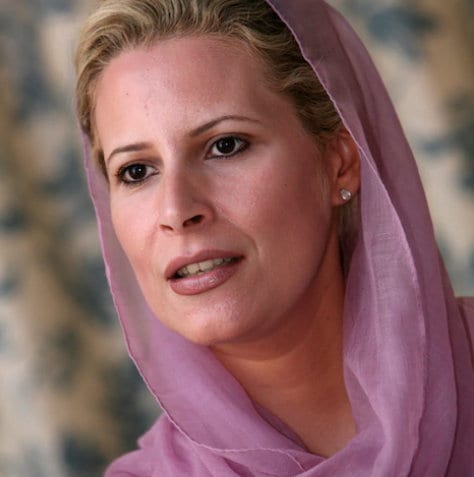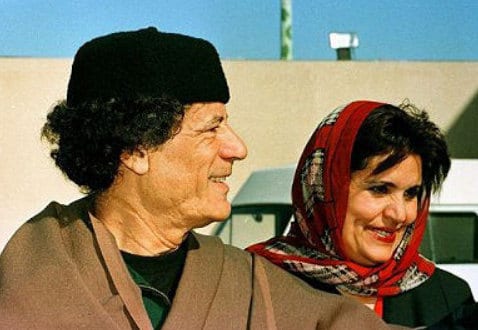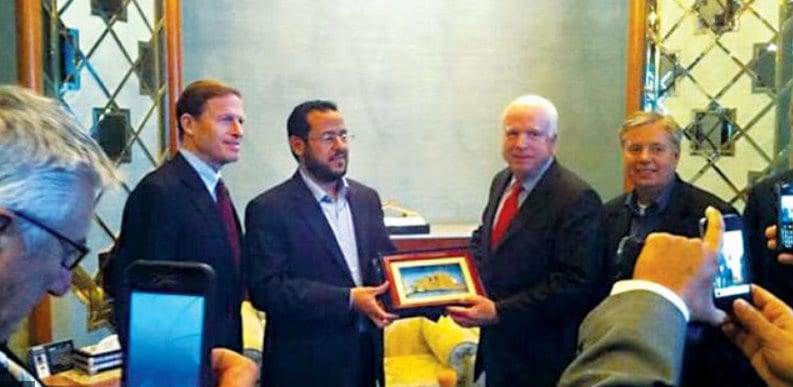Herland Report: The story of the wife of Muammar Gaddafi, Safia Farkash post 2011 is merciless.
It is hard to find anything positive to say about the NATO assault on Libya, 2011. It is now common knowledge that what the Americans did was help the Al Qaida affiliated groups to power.
Since then, Libya has plunged into a dehumanizing civil war, with various war lords controlling prisons and terrorizing the local population, without the US or EU stopping this horror.
The Libyan leader Muammar Gaddafi was brutally killed in Libya many years ago. As the Libyan civil war rages on, we republish this article, which sums up the level of injustice done to the family members of leaders who have fallen out of favor in the West.
In this case, the wife and daughter of Muammar Gaddafi writes Hanne Herland, founder of Herland Report.
And Gaddafi’s wife, former First Lady of Libya, Mme. Safia Farkash and his daughter Aisha Gaddafi is still under travel ban, with little or no access to their private bank accounts that were frozen in 2011.
This is the Western procedure, to freeze the bank accounts of citizens that are not indicted or tried in any court of law? To ban them from travelling indefinitely?
Since when was this kind of treatment a Western, “civilized” way of treating national leaders’ families?
The UK published its report in 2016, and its examination revealed extensive misinformation and fake news reported by leading media outlets. The media presented a string of decisive lies about Gaddafi and the situation on those momentous days of February, 2011—lies that opened the floodgates for NATO’s waging of war.
We now know Gaddafi was not “killing his own people,” ran a socialist state with lavish benefits for its citizens, that exile-Libyans with ties to Al Qaida affiliated groups were central to the lies presented in Western media. Some of which have become very rich after the NATO military coup, 2011. Read about it below.
Since that is the case, why are Safia Farkash and Aisha Gaddafi still are subjected to homelessness and forced displacement?
What is their criminal acts, which are in violation of international humanitarian and humanitarian law, since they are treated as criminals in the Western system?

At The Herland Report we have written extensively on the matter, also post 2011, on domestic Libyan matters, the situation of the Tawhargha tribe and the thousands who are incarcerated in Libyan prisons, run by war lords, where they stay for years without a trial.
RELATED POSTS:
- The New Libya, the return of a Gaddafi? Hanne Herland, WND.
- Power vacuum in US, Europe, Israel emboldens Ottoman Erdogan in Libya.
- Libya Militia Prisons hold thousands unlawfully # Saadi Gaddafi.
- Syria Now… Libya Next? Erdogan Plays Both Sides, Steve Brown.
In history, it has hardly been a Western tradition to keep a national leader’s family as hostages, such as Safia Farkash and Aisha Gaddafi, years after the leader was killed. Yet, this is also the case with Libya.
Muammar Gaddafi was killed in October 2011, and still to this day the family have not received information on where he is buried. Already in 2013, Safia Farkash asked to be given her husband’s body:
The widow of ousted Libyan dictator Muammar Gaddafi has urged the United Nations and the European Union to help her recover the remains of her husband and their son Mutassim. In a letter published on the website of Voice of Russia radio on Sunday, Safia Farkash also called on the African Union to investigate the deaths of the two men.
Many years later, Mme. Safia Farkash Gaddafi is still struggling to be able to travel freely, not to mention access to private bank accounts that were frozen by the US back in 2011.
Farkash is not, as far as we are aware, indicted in any court case, no trial has deemed her guilty of theft of any Libyan funds.
How then is she still denied access to her how money? Why is her daugther Aisha still denied the right to travel freely?
The head of the Security Council’s sanctions committee announced that the committee would accept Safia Farkash, the widow of the late leader Muammar Gaddafi, from the travel ban. He reveals that his committee received letters and communications from the concerned point of contact demanding the removal of Aisha Gaddafi from the list.
The decision of the Sanctions Committee on the need for Safia Farkash appears to be a few years late, as a travel ban on a woman at this age is fundamentally wrong.
The same is true of Dr. Aisha Gaddafi, the international lawyer, and the goodwill ambassador at the United Nations. “I am now in custody with my children and my mother in Amman and I have been chatting in secret,” Dr. Aisha said in previous remarks.
“I am not allowed to make or receive international calls and I am not allowed to travel to other countries since 2011,” she said.

The observer says that the women and their brothers are subjected to homelessness and forced displacement. They are looking for lost rights in the absence of justice in international courts and the absence of law in their country, which almost denies them the right to live in it.
That society that raped their security and dreams and deprived them of their legitimate rights in a dignified life?
Is their freedom of movement among the countries of the world a form of terrorism?
So, what is their criminal acts, which are in violation of international humanitarian and humanitarian law?
RELATED POSTS:
- Under autocratic Muammar Gaddafi, Libya was Africa’s richest welfare state.
- Memorandum on Libya: Fabrications against the State – Saif al-Islam Gaddafi.
- Horrifying Militia Rule in Libya post NATO assault 2011. An analysis.
- NATO’s role in Libya war is one of the worst examples of Western assault in modern history, Hanne Nabintu.
- NATO chief Jens Stoltenberg would gladly crush Libya again, Hanne Nabintu, WND.
Why were they not put in jail, or at least imposed on them, if their crime was so great? Where is the indictment against them, and if there are none, why are they punished?
Many questions may be posed regarding the injustice against Mme. Safia Farkash Gaddafi and her daughter, Aisha.

Muammar Gaddafi was a known enemy of al-Qaeda
Benghazi, in eastern Libya, gained particular notoriety for being an al-Qaeda-affiliated and Sunni-extremist terrorist lair. In early February, 2011, riots broke out there. According to the CIA, for years there they had been training and then sending Islamists to Afghanistan, Pakistan and Iraq.
It was no secret that since 1995, attempts had been made to murder Gaddafi by al-Qaeda, which has had one of its strongest bases in the Benghazi area for years—a region that has been one of the most active in the world and has sent the most al-Qaeda jihadists off to the war in Afghanistan.
Gaddafi was also the first Muslim leader who called for Osama bin Laden’s arrest. The fact that Libyan Islamic Fighting Group leader, Abdelhakim Belhadj—also commander of the al-Qaeda faction in Libya—ended up as the military governor of Tripoli in cooperation with the West at the end of NATO’s war—a man who fought with Osama bin Laden in Afghanistan only years before—is hardly a coincidence.

Belhadj was later photographed together with and honoured by Republican senator John McCain at a ceremony where he was referred to as Libya’s “heroic freedom fighter”.
Belhadj has since reportedly become Africa’s richest man, now with a net worth of around 19 billion dollars.
In the early days of the invasion, Gaddafi said that those who were behind it were not Libyans, but rather al-Qaeda and foreign fighters. Qatar has since proven to play a central role.
The country’s leader, Sheikh Tamim bin Hamad al-Thani, was one of Hillary Clinton’s closest partners and among the biggest contributors to the Clinton Foundation at the time.
Clinton’s Washington-based ties to the Muslim Brotherhood have long been discussed. The shuttle running between Clinton and al-Thani on those momentous days in February—along with the millions in funds transferred from Qatar to the Clinton Foundation—in the run-up to the Libyan War have been widely publicised by Wikileaks, Judicial Watch and other sources.
It was also a known fact that Gaddafi, the husband of Safia Farkash, had long challenged the Saudi Dynasty—in the homeland of Wahhabism and Sunni extremism.
It was at this time that Gaddafi also warned that millions of Africans would flee from Libya and head for Europe if Libya was destabilized. Millions have since undertaken the voyage to Europe via Italy.

Libyan War was result of Sarkozy’s vendetta?
The famous French philosopher, Bernard, played a central role in the run-up to the Libyan War. He travelled by shuttle between France and Libya.
And spoke on behalf of Sarkozy, as shown by local footage in Libya, saying that the war was a result of President Sarkozy’s personal ambition to pull off a regime change in Libya.
As we know, Sarkozy was recently charged with corruption in France for allegedly accepting millions from Gaddafi. Henri-Lévy says in the video “Sarkozy called me personally…he says that this war is his personal war, his personal, strategic war against Gaddafi. It wasn’t originally NATO’s idea, nor the UK’s, this was Sarkozy’s personal invasion.
He’s very happy to see that all of you are involved in this war, Arabs, Berbers, together hand in hand you won’t let Sarkozy down, and his troops support you every step of the way in this war of his”.
New meetings were held on 29 March, this time in London, and a number of prominent people conversed with British Foreign Secretary William Hague.
Perhaps the most well-known of them was Qatar’s Prime Minister and Foreign Minister, Sheik Hamad bin Jassim bin Jaber al-Thani.
Qatar had already been the first nation to approve the interim government, which was actively supported by the Muslim Brotherhood, and al-Thani encouraged other nations to do the same.
He also confirmed that Qatar actively supported the rebels militarily and wanted to set up a no-fly zone. It was important, he said, to put a stop to Gaddafi and the ongoing “massacre of civilians” in Libya.

Undocumented media rumors paved way for the NATO invasion
The interim government leader, Mustafa Abdul Jalil, also quickly called for an immediate no-fly zone because “Gaddafi is attacking the people from the air”.
He asserted that Gaddafi himself was responsible for all of the attacks perpetrated in Libya.
At the time he also said that he knew that Gaddafi himself had orchestrated the Lockerbie bombing, where American Pan Am Flight 103 exploded over Scotland, killing 270 people.
President Barack Obama commented at the time that “military fighter jets and helicopters bombed innocent people who had no chance to defend themselves against the airstrikes”.
He said that “water supplies were cut off in Misurata, which affected hundreds of thousands of people”. Nevertheless, in early March, the Pentagon had already denied that such attacks had happened.
U.S. Defense Secretary Robert Gates was asked whether they had found evidence that there had been airstrikes, to which he replied “we’ve seen the media reports, but have found nothing to confirm them”.
Still the newspapers continued to write as if the rumours were true, despite the fact that they had already been disproven. As everyone should know by now, 90% of the American media is owned by six companies. In 1983, there were over 50 different companies and ownership structures that owned the same U.S. media organisations. There has been considerable consolidation of these organisations in recent years.
When an entire country’s media is left in the hands of so very few, it is easy to influence people’s opinions and make them believe practically anything. Libya has since been left in total ruins.
Before the 2011 war, Libya was the richest state in Africa; a socialist society that was unique in the Middle East and Africa; a welfare state that afforded rights for its citizens to an extensive benefits system. after 2011, we have seen massive Media lies about Libya War. Safia Farkash, wife of Gaddafi has since lived in exile. Photo: Travel Time.
NATO’s military coup based on media lies
The military coup that led to al-Qaeda-affiliated groups taking power in Libya was made possible in March 2011 by UN Resolution 1973, which established a no-fly zone.
Norway was one of the first countries to enter the war.
It was approved by the UN Security Council since information was provided claiming that Muammar Gaddafi attacked his own people, bombed hospitals and so on. These accusations, which were never verified, were the false premises on which NATO based its reaction against Gaddafi’s administration.
It became apparent early on that there was no evidence to prove that Gaddafi, the husband of Safia Farkash, had plans to attack his people. But this fact received little press coverage. Russian intelligence also confirmed with satellite pictures that no planes were flying at the time.
Professor at the Lyndon B. Johnson School of Public Affairs, Alan J. Kuperman, has since stated that “Gaddafi never threatened civilian massacre in Benghazi, as Obama alleged”.
“No mercy will be shown” he said in his speech, which was directed at the rebels and published on 17 March. The New York Times also confirmed in an article that Libya’s leader offered amnesty to any rebel that “put down their weapons”. Gaddafi even promised them a chance to flee the country via Egypt in order to prevent continued battles.
Abusing the no-fly zone to attack the country from the air
Some protests arose in the U.S., which were quickly drowned out by the flood of media.
Professor Alan Kuperman recounted to Democracy Now that murdering the children and families of heads of state goes thoroughly beyond the UN mandate, which was about protecting civilians—not killing the families of leaders.
He asked how attacking families of civilians in residential areas has anything to do with “protecting noncombatants”.
This undermines the respect for international law, he said, and nowhere does it say that the way to go after a leader is to murder his family, grandchildren and children.
Kuperman tells journalist Amy Goodman at Democracy Now that chronologically speaking, what happened was that a small group of rebels attacked armouries and government-controlled areas in Benghazi in February and that in March, Gaddafi warned them about continuing to do so, as his forces would bring the rebellion to a halt. The New York Times also confirms that the rebellion was “staged by rebels”.
Other sources confirmed early on that the militant group that Gaddafi took action against was an al-Qaeda-affiliated rebellion on 17 February 2011, where rebels launched an attack on a military camp in Benghazi, occupied it and stole weapons and military equipment from the site.
Gaddafi’s response to send his convoy of military vehicles to stop this was not a violation of international law, but instead was what you would expect any head of state to do in order to protect their country from terrorists.
Gaddafi’s threats were directed at the rebels—not civilians—but because the rebels realised that Gaddafi’s forces were going to attack them, they were infuriated that it would be a “civilian bloodbath” if NATO didn’t intervene.
The point is that Gaddafi’s forces were faced with an attack aimed at the rebels in Benghazi and there was nothing to suggest otherwise. Data from Human Rights Watch confirms this, among other things.
According to HRW’s data from Misurata, which at the time had been retaken by Gaddafi’s forces, only 3% of the wounded were women.
The rest were rebels, many of whom were not from Libya. Civilian areas and private residences were not attacked by Gaddafi’s Jamahiriya forces in the city.
The government forces were simply engaged in stopping the military rebellion. The point of the no-fly zone was to prevent Gaddafi from resisting the U.S.-supported rebels and NATO’s upcoming military coup from the air.
It quickly became evident that NATO bombed civilian areas and implicitly accepted that the rebels did the same.
British report shows exiled Libyans played significant role
The UK House of Commons Foreign Affairs Committee published its report in August, 2016.
The report emphasises that the premise for the intervention in Libya’s domestic affairs, which was based on the accusations of “Gaddafi murdering his own people” and “genocide in Libya”, was a lie that was propounded by Western and Gulf State media. It stated:
The Foreign Affairs Committee concludes that the British government “failed to identify that the threat to civilians was overstated and that the rebels included a significant Islamist element.”
- Qaddafi was not planning to massacre civilians. This myth was exaggerated by rebels and Western governments, which based their intervention on little intelligence.
- The threat of Islamist extremists, which had a large influence in the uprising, was ignored — and the NATO bombing made this threat even worse, giving ISIS a base in North Africa.
- France, which initiated the military intervention, was motivated by economic and political interests, not humanitarian ones.
- The uprising — which was violent, not peaceful — would likely not have been successful were it not for foreign military intervention and aid. Foreign media outlets, particularly Qatar’s Al Jazeera and Saudi Arabia’s Al Arabiya, also spread unsubstantiated rumors about Qaddafi and the Libyan government.
- The NATO bombing plunged Libya into a humanitarian disaster, killing thousands of people and displacing hundreds of thousands more, transforming Libya from the African country with the highest standard of living into a war-torn failed state.
The report also shows to what extent the Libyan War was propelled by exiled Libyans that had it out for Gaddafi. A number of extremist families with ties to al-Qaeda-affiliated groups, among others, were sent into exile by Gaddafi, as he would tolerate no such extremism in Libya.
The very problem in Syria too was that the “moderate rebel groups” supported by the US often affiliated with Al Qaida, ISIS and other rebel groups. Many have commented on the hypocrisy: Why pretend that these are not our allies?
The Judicial Watch retrieved DIA report from 2012 demonstrated who was allied with who in the Syria war. The Report came from the US Defense Intelligence.
The Manchester bomber, among others, was an exiled Libyan whose family had been driven from Libya by the Gaddafi regime on account of the family’s al-Qaeda links. As we know, the Manchester bomber was also recruited by the British to be a “rebel” in Syria and worked for the British there.
Professor at King’s College in London, George Joffé, confirms in the report that President Sarkozy’s administration was heavily influenced by exiled Libyans with close contacts in the French intellectual milieu (read Bernard Henri-Lévy and friends), and they worked together to pull off a coup d’état in Libya.
The British report concludes by saying that exiled Libyans, for various reasons, knowingly exaggerated the likelihood of “genocide in Libya” in order to persuade the West to intervene, which it did.
Maybe we eventually will have reports on why the Western-backed government in Tripoli continues to hold thousands of Gaddafi loyalists prisoner without charge or trial in Libya. Weren’t we supposed to contribute with democracy and human rights?
This article offers viewpoints based on information provided by sources on the ground in Libya, as well as external articles that might be useful in arriving at an understanding of the 2011 Libyan war. We believe that the information comes from reliable sources, but cannot guarantee the information to be free of mistakes and incorrect interpretations.










